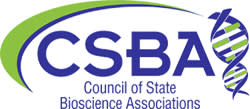IowaBio signs on to CSBA letter to congressional leadership expressing strong concerns with the Democrats’ drug pricing proposal

IowaBio signs on to CSBA letter to congressional leadership expressing strong concerns with the Democrats’ drug pricing proposal
July 20, 2022
The Honorable Charles Schumer
Majority Leader
U.S. Senate
322 Hart Senate Office Building
Washington, DC 20510
The Honorable Mitch McConnell
Republican Leader
U.S. Senate
317 Russell Senate Office Building
Washington, DC 20510
The Honorable Nancy Pelosi
Speaker
U.S. House of Representatives
1236 Longworth House Office Building Washington, DC 20515
The Honorable Kevin McCarthy
Republican Leader
U.S. House of Representatives
2468 Rayburn House Office Building
Washington, DC 20515
Dear Senate Majority Leader Schumer, Senate Republican Leader McConnell, House Speaker Pelosi, and House Republican Leader McCarthy:
The Council of State Bioscience Associations (CSBA) is an alliance of independent, state and territory based, non-profit trade associations, each of which advocates for public policies that support responsible development and delivery of innovative life-enhancing and life-saving biotechnology solutions. We write today to express our serious concerns about the proposals included in the recently released Senate Democrats’ drug pricing proposals, which will devastate that innovation. Most of our biopharmaceutical member companies are small-to-medium in size and relatively few have products on the market. Yet, these companies are leading the world in cutting edge research to develop new therapies and cures, including gene and cell therapies, and of course, vaccines and treatments for COVID-19.
We take pride that our biopharmaceutical companies are providing hope to patients and their families, and that the US biotechnology sector has innovated in record time to develop vaccines and therapies to address the global COVID-19 pandemic. Indeed, our industry continues to lead the world in advancing treatments and cures for cancer, sickle cell and rare, previously untreatable diseases.
These and other incredible advances in biomedical research were only possible because in the past, the biotechnology sector was able to attract significant capital investment, and this environment was bolstered thanks in part to important Federal programs such as SBIR/STTR1 funding, which itself has yielded at least 99 commercialized drugs since the program’s inception.
Most of our member companies do not yet have commercial products and are reliant on private sector investment. Uncertainty about drug pricing legislation, CMS reimbursement issues (notably for products approved via the accelerated approval pathway), supply chain concerns, threats to intellectual property protections, an unclear pathway for SBIR reauthorization, and potential changes to FDA's accelerated approval process are contributing to a lack of investor confidence.
As capital markets across sectors continue to contract, the impact on biotech is even more stark. Since peaking in February of 2021, Biotech XBI ETF Index is down 62% -- closing at $174.89 on February 9, 2021 and plummeting to $65.68 by close on June 15, 2022. 2 For the biotech sector, the confluence of policy concerns, daunting legislative proposals and increasing regulatory uncertainty have created the proverbial ‘perfect storm’ for our sector, to devastating effect.
From an economic perspective, the specter of government price setting threatens to undermine a sector that has created over 1.8 million jobs3 across all 50 states and that represents a large portion of our nation’s Gross Domestic Product (GDP) - generating an economic output of approximately $2.6 trillion annually.4 The sector already takes on extraordinary risks and makes significant investments in the hope that a few will eventually lead to the next generation of life-saving treatments for patients, and the looming potential of price controls is truly an existential threat to innovation. Biopharmaceutical companies reinvest more into R&D than any other sector -- a 2021 Congressional Budget Office report highlighted reinvestment rates of over 25% in 2018 and 2019.5 In the face of declining capital investment, companies’ ability to reinvest suffers all the more.
Given the impact on investor confidence, the downstream effects of the recently released Senate Democrats’ drug pricing proposal will significantly chill research and development, eliminate American jobs, and drive capital investment away from the life sciences and toward lower risk sectors. Losing this pipeline of investment will significantly disrupt the existing pipeline of potentially transformative treatments. In oncology alone, the University of Chicago found that price controls would reduce overall annual cancer R&D spending by about $18.1 billion, or 31.8%.6
While we applaud your efforts to enhance the Part D program by capping seniors’ out of pocket costs and smoothing the patient out of pocket burden over time, we strongly oppose the use of government-imposed pricing to achieve this aim. Proposals giving government the power to set prices in Medicare will eliminate competition, disrupt market forces, disincentivize investment and most harmful of all, they will quash the hopes of patients who are relying on this industry to develop next-generation cures and therapies for serious, life-threatening diseases.
Patients deserve hope and access to life-saving therapies, and we believe the biotechnology sector can deliver these so long as the financial ecosystem fosters healthy competition. We appreciate the bipartisan and bicameral efforts to address many of our sector’s most urgent concerns, such as international reference pricing, but we believe there is much more to be done.
We stand ready to work with you to consider alternative proposals such as rebate pass-through and PBM transparency to help propel American innovation forward and deliver affordable, accessible, and innovative therapies for patients who need them.
Thank you for your consideration.
Please contact CSBA Executive Director, Michele Oshman at moshman@bio.org with any questions.
Respectfully,
Alabama - BioAlabama
Arizona - Arizona BioIndustry Association, Inc. (AZBio)
California - Biocom California
California - California Life Sciences
California - Southern California Biomedical Council
Colorado - Colorado BioScience Association
Connecticut - BioCT
Delaware - Delaware BioScience Association (DelawareBio)
Florida - BioFlorida
Georgia - Georgia Bio (GABIO)
Idaho - Idaho Technology Council
Illinois - Illinois Biotechnology Innovation Organization
Indiana - Indiana Health Industry Forum
Iowa - Iowa Biotechnology Association
Kansas- BioKansas
Kentucky - Kentucky Life Sciences Council
Louisiana - Louisiana BIO
Maine - Bioscience Association of Maine (BioME)
Maryland - Maryland Technology Council
Massachusetts - Massachusetts Biotechnology Council (MassBIO)
Michigan - Michigan Biosciences Industry Association (MichBIO)
Minnesota - Medical Alley Association
Missouri - Missouri Biotechnology Association
Montana - Montana BioScience Alliance
Nebraska - BioNebraska
Nevada - Nevada Biotechnology & Health Science
New Jersey - BioNJ
New Mexico - New Mexico Biotechnology and Biomedical Association
New York - NewYorkBIO
North Carolina - North Carolina Biosciences Organization (NCBIO)
North Dakota - Bioscience Association of North Dakota
Ohio - BioOhio
Oklahoma - Oklahoma Bioscience Association
Oregon - Oregon Bioscience Association
Pennsylvania - Life Sciences Pennsylvania (LSPA)
Puerto Rico - INDUNIV
Rhode Island - Rhode Island Bio
South Carolina - South Carolina BIO
South Dakota - South Dakota Biotech Association
Tennessee - Life Science Tennessee
Texas - Texas Healthcare and Bioscience Institute
Utah - BioUtah
Vermont - Vermont Biosciences Alliance
Virginia - Virginia Biotechnology Association (VABIO)
Washington - Life Science Washington
West Virginia - Bioscience Association of West Virginia
Wisconsin - BioForward Wisconsin
1 National Academies; Assessment of the SBIR and STTR Programs at the National Institutes of Health (2022); https://nap.nationalacademies.org/catalog/26376/assessment-of-the-sbir-and-sttr-programs-at-the-national-institutes-of-health
Accessed 12 July 2022 19:25
2 https://www.google.com/finance/quote/XBI:NYSEARCA?sa=X&ved=2ahUKEwi-gsiMme_4AhU_D1kFHcaVCaEQ3ecFegQIHRAg Accessed 10 July 2022 16:52
3 THE BIOSCIENCE ECONOMY: PROPELLING LIFE-SAVING TREATMENTS, SUPPORTING STATE & LOCAL COMMUNITIES https://www.bio.org/sites/default/files/2020-06/BIO2020-report.pdf Accessed 10 July 2022 17:01
4 Ibid.
5 https://www.cbo.gov/system/files/2021-04/57025-Rx-RnD.pdf
6 https://ecchc.economics.uchicago.edu/2022/06/27/policy-brief-the-impact-of-recent-white-house-proposals-on-cancer-research/
Additional Info
Source : https://iowabiotechassociation.growthzoneapp.com/ap/CloudFile/Download/P3BvvJbp
